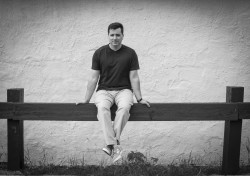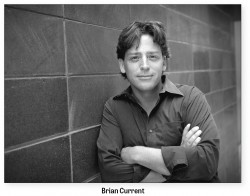 Johannes Debus will take the podium at Koerner Hall on May 24 to launch the 2017 edition of the Royal Conservatory’s 21C Music Festival, along with the Canadian Opera Company Orchestra, the Elmer Iseler Singers and soloists.
Johannes Debus will take the podium at Koerner Hall on May 24 to launch the 2017 edition of the Royal Conservatory’s 21C Music Festival, along with the Canadian Opera Company Orchestra, the Elmer Iseler Singers and soloists.
The program they will offer includes two works by 21C Festival artistic advisor, Brian Current, one of four composers featured during the festival who are former grand prize winners in one of the CBC/Radio-Canada national competitions for young Canadian composers. Current, Chris Paul Harman, Ana Sokolović and Andrew Staniland all have premieres of major works during the festival. These four composers, who won the CBC competition when they were in their 20s, 30s or, in Harman’s case, teens, have all demonstrated the promise and the purpose of the composition competitions by developing into successful professionals, now among the nation’s leading mature composers.
By way of background, the CBC/Radio-Canada National Radio Competition for Young Composers (1973-2003) was initiated by John Peter Lee Roberts, who was head of CBC Radio Music from 1965 to 1975. Roberts, who commissioned over 150 original Canadian compositions for broadcast during his tenure as head of music, saw the development of emerging composing talent in Canada as one way of fulfilling the objective, as defined by the Broadcasting Act, to “Encourage the development of Canadian expression by providing a wide range of programming that reflects Canadian attitudes, opinions, ideas and artistic creativity.”
Clearly, the development of artistic creativity spoke to Roberts in a strong voice, and he grasped the need to develop the next generation of Canadian composers. He brought together his colleagues at Radio-Canada, as well as the Canada Council to help fund the competition in its first year, 1973, and then received additional support from several provincial arts councils the following year. When Roberts handed me the Young Composers project at the end of his time at Radio Music, in 1975, it was already the most important vehicle for young and emerging composers in Canada. The creation in 1978 of the national new music series Two New Hours provided a national network radio vehicle to share the unfolding story of the emergence of Canada’s musical future. And through the system of international program exchange between the world’s public broadcasters, we were also able to introduce the music of these young creators to listeners around the globe. The linkage of a national contemporary music network series with the young composers competition produced a generation of new Canadian composers. The list of winners reads like a Who’s Who of contemporary Canadian music.
 Returning to Brian Current, he was a finalist at age 24 in the 1996 CBC/Radio-Canada competition but he won the Grand Prize when he entered again in the 2001 edition. He told me that just being a finalist opened a door that inspired him to raise his composing to a higher level. Current is represented in the 21C Music Festival by performances of two movements from his large-scale multi-movement oratorio, The River of Light, for soloists, choir and orchestra. Current says that “The River of Light is about transcendence and is based on the texts of several traditions (Hindu, Christian, Jewish, First Nations Canadian, Sufi, Maori and Chinese) that describe mystical journeys towards an exalted state.”
Returning to Brian Current, he was a finalist at age 24 in the 1996 CBC/Radio-Canada competition but he won the Grand Prize when he entered again in the 2001 edition. He told me that just being a finalist opened a door that inspired him to raise his composing to a higher level. Current is represented in the 21C Music Festival by performances of two movements from his large-scale multi-movement oratorio, The River of Light, for soloists, choir and orchestra. Current says that “The River of Light is about transcendence and is based on the texts of several traditions (Hindu, Christian, Jewish, First Nations Canadian, Sufi, Maori and Chinese) that describe mystical journeys towards an exalted state.”
The first part, The Seven Heavenly Halls, won the inaugural Azrieli Commissioning Competition prize in 2015. The world premiere was last October in Montreal with the Montreal Symphony Orchestra and Chorus under Kent Nagano. Mervon Mehta, the Royal Conservatory’s (RCM) executive director of performing arts, was present for the premiere and was so moved by the work, he persuaded Debus to perform it with the Canadian Opera Company Orchestra, together with tenor soloist Andrew Haji and the Elmer Iseler Singers at the 21C opening. Debus describes his feeling about the piece this way: “I would like to call The Seven Heavenly Halls an ecstatic, overwhelmingly colourful, opalescent, kaleidoscopic and at times turbulent journey through a galaxy of mystique and vision. It feels as majestic and luminous as a temple.” The text of the work is based on the Zohar, which Current’s longtime collaborator and librettist, Anton Piatigorsky calls, “The most mysterious of Jewish mystical texts.”
Part III of The River of Light will receive its world premiere in the concert. It’s a work for narrator, choir and orchestra titled Nàaka, and is based on stories of the Northern Lights in the Tłįchǫ Dene tradition. “I was grateful to meet the remarkable Tłįchǫ Dene author and storyteller Richard Van Camp, who is quite justly treated like royalty wherever he goes in the Northwest Territories,” says Current. “Spending just one minute listening to Richard’s stories is to be immediately put under his spell.”
In Nàaka, (meaning Northern Lights, in the language of the Tłįchǫ Dene), Van Camp will narrate his text accompanied by the orchestra and choir. The translations and pronunciations were prepared by Tłįchǫ Elder Rosa Mantla. The work was commissioned by the Royal Conservatory/Koerner Hall with support from Kris Vikmanis and Denny Creighton. (The May 24 opening concert also includes music by American composer/conductor Matthew Aucoin, Korean composer Unsuk Chin and Canadian composer/conductor Sammy Moussa.)
Chris Paul Harman was 19 years old when he won the CBC/Radio-Canada Young Composers Competition Grand Prize in 1990, making him the youngest laureate of the competition. Similar to Current, he had been a finalist in an earlier edition of the competition, in Harman’s case at the age of 16. Harman’s two works, included in the May 28 21C concert, presented by Soundstreams Canada, are both part of a series of pieces he based on the music of the English popular composer Ray Noble (1903-1978) and, in particular, songs recorded in 1934 by singer Al Bowlly, Love Locked Out and It’s All Forgotten Now. Harman wrote that, “The popular music of this era appeals to me for its elegance, melodic and harmonic sophistication and subtly nuanced orchestration.” His Love Locked Out was commissioned by the Philharmonia Orchestra in 2014 and premiered in London, England. Harman notes that “in alluding to the popular music of a bygone era, Love Locked Out likewise chronicles developments in the classical music of the same period, by quoting or adapting excerpted material from seminal works by Anton Webern (Klavierstücke, 1925) and Béla Bartók (Music for Strings, Percussion and Celesta: first movement, 1937), both of which contain the opening five-note pattern of Ray Noble’s tune.
It’s All Forgotten Now, receiving its world premiere, was co-commissioned for Soundstreams and 21C by Stanley Witkin and the Royal Conservatory.
Canadian Arts Song Project (CASP) co-artistic directors Steven Philcox and Lawrence Wiliford created a program for the 21C Music Festival on May 25 that celebrates the Canadian sesquicentennial with Canadian art song. They commissioned Montreal composer Ana Sokolović to create a cycle of songs that sets poetry from every province in Canada, Dawn Always Begins in the Bones. And they also included the Canadian premiere of a song cycle by Andrew Staniland, Peter Quince at the Clavier.
Sokolović and Staniland complete our quartet of former CBC grand prize winners featured at this year’s 21C. Ana Sokolović was the Grand Prize winner in the 1999 CBC/Radio-Canada competition and St. John’s composer Andrew Staniland won the 2009 CBC/Radio-Canada Evolution Young Composers Competition, which was a one-time event, created as a new vision of the earlier competition. For both young composers, their respective grand prizes raised their standing in the musical community. “It gave me, an emerging composer, crucial visibility at an important time in my creative career,” Sokolović said, “like a Cinderella moment.”
Sokolović told me that her search for the right poetry for her new cycle took two years. She was assisted by University of Toronto professor Linda Hutchinson. Staniland’s cycle, on the other hand, sets a long, four-part poem by American Wallace Stevens. The CASP concert, which takes place at the RCM’s Temerty Theatre, also includes Lloyd Burritt’s Moth Poem. Lawrence Wiliford said, “We are thrilled to have commissioned and to be presenting an incredible new work by Ana Sokolović in recognition of Canada’s 150th anniversary of Confederation and are delighted that we will be presenting the Canadian debut of a brilliant set of songs by Andrew Staniland as part of the the 21C Festival at the RCM.” Baritone Ian MacNeil will sing the Staniland and Burritt songs with pianist Mélisande Sinsoulier. COC Ensemble director Liz Upchurch will accompany the Sokolović cycle, sung by soprano Danika Lorèn, mezzo soprano Emily D’Angelo, tenor Aaron Sheppard and baritone Bruno Roy. In fact, it’s an all-Canadian cast!
The 21C Music Festival consists of nine concerts and 31 premieres in the space of five days, May 24 to 28. Besides the concerts already mentioned, there are performances of contemporary music by the Bang on a Can All Stars, violinist Benjamin Bowman with pianist Claudia Chan, the Cecilia String Quartet, Cinq à Sept, Angèle Dubeau & La Pietà and the Soundstreams Emerging Composers Workshop. The affordable Festival Pass makes it possible for every new music lover to take in the entire program. The major sponsors of the 21C Music Festival are Michael and Sonja Koerner.
David Jaeger is a composer, producer and broadcaster based in Toronto.



